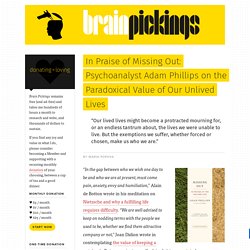Fear Of Missing Out
FOMO vs JOMO
FOMO: This Is The Best Way To Overcome Fear Of Missing Out. You hear about FOMO a lot these days.

In fact, the word was added to the Oxford English Dictionary in 2013. What does it really mean? A recent study on the subject defined it as: …‘‘the uneasy and sometimes all-consuming feeling that you’re missing out – that your peers are doing, in the know about, or in possession of more or something better than you’’. Under this framing of FoMO, nearly three quarters of young adults reported they experienced the phenomenon. It’s certainly not a good thing. Sometimes that alleviates the anxiety — but often it doesn’t. Is this just a symptom of modern life? Research has answers. FOMO Comes From Unhappiness Caught in the FOMO cycle?
Our findings show those with low levels of satisfaction of the fundamental needs for competence, autonomy, and relatedness tend towards higher levels of fear of missing out as do those with lower levels of general mood and overall life satisfaction. So you’re not feeling so hot about things. The Facebook Illusion Attention.
You May Have #FOMO, or is it #FOKU?
Even though I have an awareness of my relationship to my smartphone, even though I take measures to limit my use, even though I have strong boundaries with my kids around their usage, if you asked me whether I feel like I have a handle on my relationship to it, I’d give you an unequivocal NO!

The more I talk to people about their relationship to their tech, the greater sense of belonging I feel. For most people, every time they see someone reach for their phone there’s a bell that goes off in the mind that creates an urge to grab their phone. Every time they’re slowing down or waiting anywhere, the idea or urge to check the phone arises.
Like an addiction, I know this is unhealthy and yet with all my mindfulness and with all the techniques out there, I struggle with this too. At last I’m finally understanding what this is all about and what to do about it. There are many theories why most people who have a Smartphone today feel this obsessive connection with it. Warmly,
Can we break free from the fear of missing out?
Here’s a test you might enjoy: rate these scenarios on a number scale, ranging from 1 for mild discomfort to 7 for outrageous distress. Scenario 1: you’re flicking through news websites, as you do every morning. Today, however, you’re behind schedule and have only 15 minutes to read articles, instead of your usual 30. You have to skip some of your favourite columns and sections.
How would you rate your level of discomfort? (Most of us would probably choose a low level, say 2.) Popular now Quantum weirdness is everywhere in the living world Why broken sleep is a golden time for creativity The virus that hitched a ride into the Grand Canyon Scenario 2: you’re visiting New York City and realise there’s no way you’ll be able to get to all the exhibits, see all the recommended plays, or take in even a fraction of the ‘musts’ your local friends have raved about. Scenario 3: you’re at dinner with friends, and you’ve all agreed to make it a strictly phone-free evening. 28 May 2014 Comments.
In Praise of Missing Out: Psychoanalyst Adam Phillips on the Paradoxical Value of Our Unlived Lives. “In the gap between who we wish one day to be and who we are at present, must come pain, anxiety, envy and humiliation,” Alain de Botton wrote in his meditation on Nietzsche and why a fulfilling life requires difficulty.

“We are well advised to keep on nodding terms with the people we used to be, whether we find them attractive company or not,” Joan Didion wrote in contemplating the value of keeping a notebook. But we are just as well advised, it turns out, to keep on nodding terms with the people we could’ve been, the people we never were, the people who perished in the abyss between our ideal selves and our real selves. So argues psychoanalyst Adam Phillips in Missing Out: In Praise of the Unlived Life (public library) — a fascinating read, acutely relevant to our culture so plagued by the fear of missing out that we’ve shorthanded it to “FOMO.” The unexamined life is surely worth living, but is the unlived life worth examining?
Attention Economy. Choose or Suffer. Regrets. Signs of Depression. Nomophobia.
Books
Sadness.



